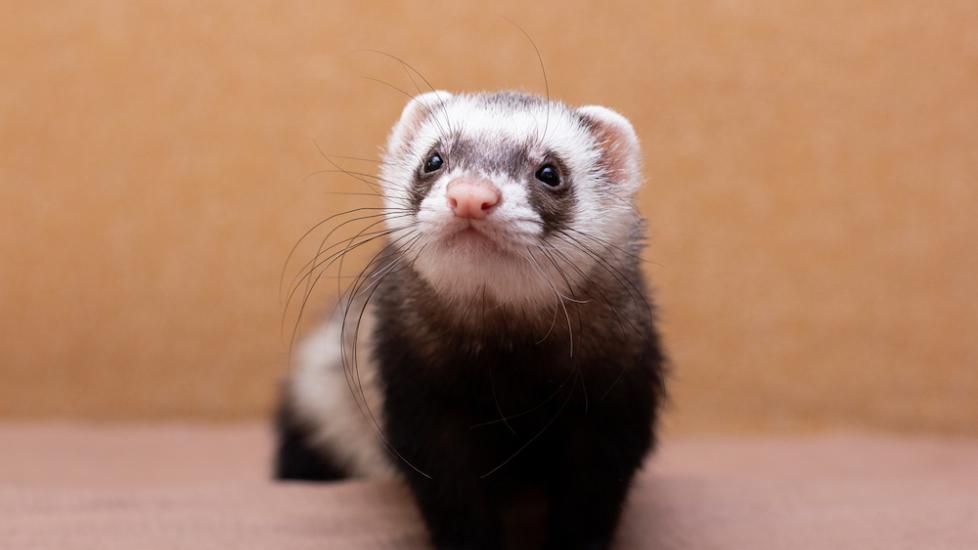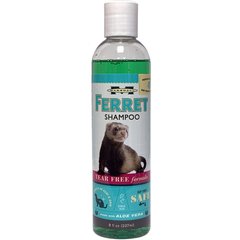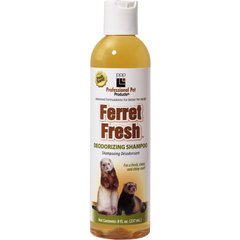Ringworm in Ferrets
What Is Ringworm in Ferrets?
Ringworm is the common name for dermatophytosis, an infection characterized by the presence of dermatophytes, a fungus that grows on the skin.
Ringworm is most common in younger and stressed ferrets, especially in group situations, like being housed in pet stores. Fortunately, ringworm is rare in pet ferrets.
Ringworm infection is contagious to other pets and humans so it’s critical that preventative measures are taken and to consult not only your veterinarian, but also your personal doctor if you suspect your ferret has an infection.
Recommended Products
Symptoms of Ringworm in Ferrets
-
Circular areas of alopecia (hair loss)
-
This includes broken hairs/poor haircoat
-
-
Dandruff
-
Different levels of redness and crusting on skin
-
Nailbed thickening or crusting
Ferrets with ringworm are seldom itchy.
Causes of Ringworm in Ferrets
In ferrets, the most common dermatophytosis infections are Microsporum canis and Trichophyton mentagrophytes fungi, which are transmitted by direct contact with infected animals or contaminated materials that carry the infection.
While the carriers of dermatophytes are usually other companion animals, recent studies suggest that animal equipment like brushes, collars, bedding, etc., can also be sources of infection.
Dermatophytes are highly resistant in various environments, making reinfection common if thorough cleansing of the environment does not occur along with treatment.
How Veterinarians Diagnose Ringworm in Ferrets
The traditional method of diagnosing ringworm involves looking at samples under a microscope or culturing. Newer technology uses the DNA of the specimens to determine the presence of specific fungi and/or bacteria.
Treatment of Ringworm in Ferrets
The first step in treating ringworm is to isolate all pets that are affected. Any space where they have been living must be cleaned thoroughly to prevent continued spread of the disease.
Treatment includes regular bathing with antifungal shampoos such as MiconaHex+Triz Shampoo for Dogs & Cats or Douxo S3 PYO Antiseptic Antifungal Chlorhexidine Dog & Cat Shampoo and application of topical lotions if the disease is limited to small areas. In severe cases, oral medications may be needed, such as griseofulvin or ketoconazole.
Cleaning the Environment
Remove all pet hair by wiping down surfaces and vacuuming. Wear gloves. Once all debris has been removed, all surfaces should be thoroughly washed and disinfected. Wash all clothing, bedding, and towels that have been in contact with the infected ferrets. Cleaning of the environment should continue daily until all infection has been cleared.
Recovery and Management of Ringworm in Ferrets
Prognosis is typically good as long as veterinary treatment is reached early and the ferret’s environment is thoroughly cleaned. Ringworm usually has no long term effects on ferrets.. In severe or neglected cases, ferrets can have permanent scarring or hair loss.
Prevention of Ringworm in Ferrets
Ringworm can be prevented by quarantining all pets for a minimum of two weeks before introduction to the household. Any entering carriers, bedding, and toys should be thoroughly washed and disinfected with chlorhexidine or 10% bleach solution and allowed to air dry before a ferret is introduced to it.
A physical examination with a ferret savvy veterinarian at first sign of any skin disease is critical to a positive prognosis.
Ringworm in Ferrets FAQs
How do you get rid of ringworm in ferrets?
Ringworm is rare in ferrets but the fungus responds to regular bathing and topical treatment in most cases.
How do I know if my ferret has ringworm?
The best way to determine if your ferret has ringworm is a thorough examination by your veterinarian.
Can you get ringworm from a ferret?
Yes, ringworm is a zoonotic disease that can be spread to other pets and humans in the household.
Featured Image: iStock.com/Irina Vasilevskaia
References
-
Morrisey, J. Infectious Diseases of Ferrets. 2020.
-
Wolf T. M. FERRETS. Manual of Exotic Pet Practice, 345–374. 2009.
-
The VIN Dermatology Consultants. Ringworm Environmental Decontamination: How to Clean Your Home When Your Pet Has Ringworm. Veterinary Partner. 2022.




